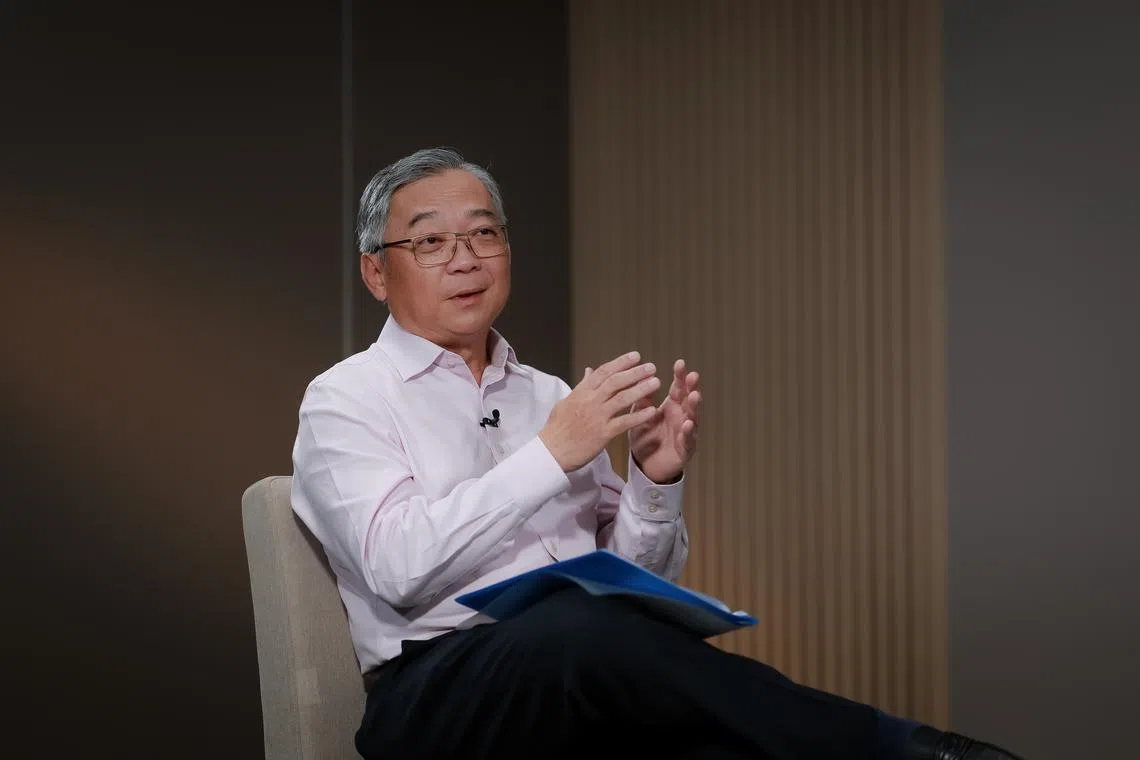Look beyond a ‘quick buck’: Gan Kim Yong’s advice to Singapore companies in China
Sign up now: Get insights on Asia's fast-moving developments

DPM Gan Kim Yong is among the current generation of Singapore leaders who have taken the baton from earlier leaders to continue working with China.
ST PHOTO: GAVIN FOO
Follow topic:
SINGAPORE - At a gallery in the Suzhou Industrial Park is a black-and-white photo of Singapore’s founding prime minister, Mr Lee Kuan Yew, who had been instrumental in setting up the park as the first government project between China and Singapore 30 years ago.
“They don’t forget their old friends,” Deputy Prime Minister and Minister for Trade and Industry Gan Kim Yong told Singapore media, citing the photo as evidence.
Mr Gan is among the current generation of Singapore leaders who have taken the baton from earlier leaders to continue working with China. Next week, when his counterpart, Chinese Vice-Premier Ding Xuexiang, visits Singapore, Mr Gan will, for the first time, co-chair the Joint Council for Bilateral Cooperation (JCBC),
The 2024 JCBC is the 20th edition, and also the first since Mr Lawrence Wong took office as prime minister in May.
The JCBC meetings offer leaders and officials from both countries a chance to build trust and understanding while collaborating on mutually beneficial projects. Such collaboration opens doors for companies to trade and invest and for more people to study and travel between the two countries.
“With every new generation of leaders, it is important for them to build trust and understanding in their own way, because very often, this trust and understanding is very personal,” said Mr Gan during an interview with Singapore media on Oct 30.
He noted that such government-to-government discussions may not seem very relevant to the man in the street. “But in fact, they have shaped the relationship between Singapore and China over the last 30 to 40 years.”
Bilateral platforms such as the JCBC have created the right conditions for more people-to-people exchanges over the years. This has also translated into other benefits for Singaporeans, including the visa-free agreement with China
Mr Gan said he is looking forward to meeting Mr Ding, whom he met at the 2023 JCBC meetings in Tianjin.
Mr Ding last visited Singapore in 2015 when he accompanied Chinese President Xi Jinping as his chief of staff. He is expected to meet several members of Singapore’s leadership during this visit, including PM Wong.
During next week’s meetings, Mr Gan expects both sides to focus on emerging areas relating to sustainability as well as collaborations on the digital front, including digital payments and trade documentation.
Economic cooperation is a key component of bilateral ties, with China being Singapore’s top trading partner. At the same time, the Republic is also China’s top foreign investor. But lacklustre growth in the world’s second-largest economy has led some Singapore companies to reassess the viability of remaining in China.
Mr Gan acknowledged that China’s economy is “facing significant headwinds”. But he remains “cautiously optimistic” about its long-term prospects.
“We have to take a longer-term view, invest in China and work hard in China, grow the business in China, and over time, I think you will reap economic benefits and returns,” he said.
He believes that there are still business opportunities, even in the property sector that has faced a slowdown in recent years.
He assessed that China’s economy needs time to recover from the Covid-19 pandemic, to boost confidence and stimulate domestic demand, and to undergo transition, particularly in sectors such as real estate.
On top of the domestic factors, the Chinese economy faces weak external demand caused by a global slowdown and geopolitical tension between Beijing and Washington and other parts of the world, he said.
But he believes in the prospects for China’s economy because it has a growing middle class with spending power that cannot be underestimated, as well as a well-trained and highly skilled workforce with room for productivity increases. The country also has innovative firms that lead the way in digital economy and green technology.
Mr Gan’s advice to Singapore companies: “It’s not (about) trying to make a quick buck, invest for a couple of years, make the profit, and take the money and run.”
Instead, they should continue to monitor China’s development, be clear about their companies’ strengths and weaknesses, and be very selective about where to do business, he said.
Competition between China and the US, the world’s two largest economies, has resulted in trade and supply chain disruption globally, affecting trade-dependent Singapore.
Mr Gan reiterated that however US-China relations develop after the US election, Singapore wants to continue to befriend and do business with both sides, on the basis of putting its national interests first.
“It is in Singapore’s interest to see a stable and peaceful relationship between the two of them, so that there’s more space for countries like us to be able to operate and to be able to grow our economy,” he said.
The agenda for the JCBC meeting is to review the progress of existing cooperation, including the three government-to-government projects in Suzhou, Tianjin and Chongqing, the state-level Guangzhou Knowledge City project, and Singapore’s eight business councils with Chinese provinces and cities.
Suzhou Industrial Park will be celebrating its 30th anniversary
The Suzhou project, which was initially designed by taking a leaf from Singapore’s industrial parks, has now developed its own model “way beyond where we started”, according to Mr Gan.
China has begun to replicate the Suzhou model in other parts of the country, and is even thinking of exporting it to other countries, he said.
“So Suzhou Industrial Park in a way has created offspring.”

